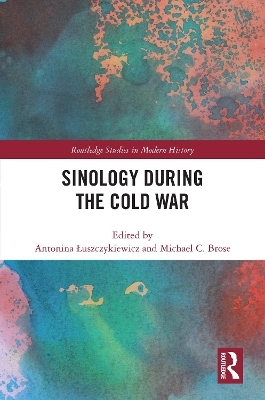
Sinology during the Cold War
Routledge (Verlag)
978-1-032-00974-2 (ISBN)
This volume provides the first study of the history of sinology (aka China studies) as charted across several communist states during the Cold War.
The People’s Republic of China was created in the first years of the Cold War, with its early history and foreign policy intimately bound up in that larger geopolitical fight. All the seismic changes in China’s geopolitical landscape—from its emergence and close relationship with the Soviet Union, to the Sino–Soviet split and the eventual rapprochement with the United States—resulted in a great deal of interest by journalists, politicians, and scholars. Yet, although scholars across the Soviet Bloc produced an impressive body of work on a range of sinological studies, with rare exceptions most of those scholars and their work remains unknown outside their own intellectual circles. This book redresses this dearth of knowledge of sinological scholarship, providing invaluable and unique glimpses of Soviet Bloc sinologists and their work during the Cold War, including cutting-edge research on lesser-studied communist states such as Poland, Hungary, Mongolia, and others.
International in scope, this book is ideal for scholars and researchers of modern history, Chinese studies, sinology, and the Cold War.
Antonina Łuszczykiewicz is Assistant Professor at the Institute of the Middle and Far East, Jagiellonian University in Kraków. She is the author of three books and a wide range of articles focusing on China–India relations, the image of Indian and Chinese people in literature and film, and Cold War discourses and narratives in the Asian context. Michael C. Brose is Professor of Practice in Central Eurasian Studies, Indiana University. Primary research interests include Yuan-Ming Dynasty China social history, historic and contemporary Chinese Muslim (Hui) social and economic issues, and the history of ethnic minorities in China. Secondary research interests include the Cold War in East Asia and southwest China–Southeast Asia relations.
THE FRAMEWORK OF SINOLOGY IN THE SOVIET BLOC PART I: PERSONAL ACCOUNT 1. Sinology in Poland during the Cold War Era. The Perspective of a Graduate and Practitioner PART II: SINOLOGY IN DOMESTIC AND INTERNATIONAL PERSPECTIVE 2. In Search of Modern China: The Development of Sinology in East and West Germany during the Cold War Era 3. "We Are Waging a Consistent, Uncompromising Struggle Against Maoism:" Coordinated Research on Modern China in the Soviet Bloc—a Hungarian Perspective 4. "China Fever" in Post-October Poland and Its Impact on Polish Sinology 5. Chinese Studies in Mongolia during the "Double Cold War" 6. Romanian Sinology during the Cold War PART III: SINOLOGISTS AND THEIR RESEARCH INTERESTS 7. Mapping the Interplay between the Individual and the Structure: The Life of a Hungarian Sinologist during the Cold War 8. Jaroslav Průšek: Communism, Modernization, and Chinese Literary Studies during the Cold War, 1950s−1960s 9. Mao and Maoism in Polish Studies in the Cold War Context, 1949–1976 10. Enter the Dragon: Chinese Cinematography in Poland in the Cold War Era
| Erscheinungsdatum | 03.05.2022 |
|---|---|
| Reihe/Serie | Routledge Studies in Modern History |
| Verlagsort | London |
| Sprache | englisch |
| Maße | 156 x 234 mm |
| Gewicht | 453 g |
| Themenwelt | Geschichte ► Allgemeine Geschichte ► Zeitgeschichte |
| Naturwissenschaften ► Geowissenschaften ► Geografie / Kartografie | |
| Sozialwissenschaften ► Soziologie ► Spezielle Soziologien | |
| ISBN-10 | 1-032-00974-8 / 1032009748 |
| ISBN-13 | 978-1-032-00974-2 / 9781032009742 |
| Zustand | Neuware |
| Haben Sie eine Frage zum Produkt? |
aus dem Bereich


